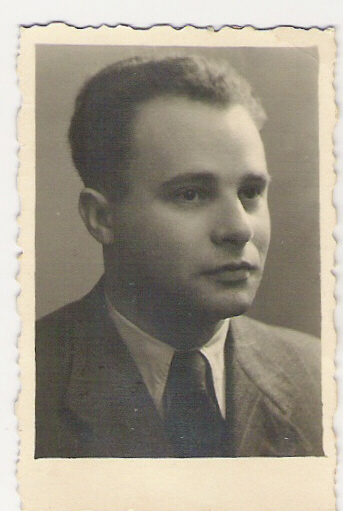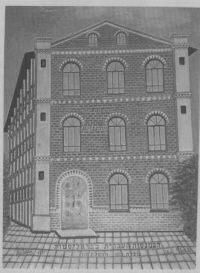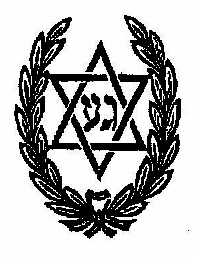During the period of my studies at the gymnasium, the store-house of
stimulation which formed my character and values was filled. I entered
the gymnasium in 1921, two years after it was founded. During my eight
years of study, I changed three buildings and many teachers. In the
early years there was a large turnover of teachers, because it was not
easy to find good ones with suitable knowledge and teaching skills. I
remember the English teacher who taught Class 2. He was a businessman
who had a good command of the English language, but had no aptitude for
teaching. During the lessons, he used to walk between the desks
muttering to himself doing business calculations... After some years,
the staff stabilized, the good teachers stayed on at the institution,
and the others left.

In the lower classes I was an average student, but my powers of
absorption improved in the higher classes. There are those who achieve
success in one moment: the event when I rose to greatness in the eyes
of my friends and the teacher is etched in my memory. In one of the
lessons, I succeeded in solving a complicated maths problem on the
blackboard that all the other top students had difficulty with. From
that moment I rose to fame, and continued to rise until I completed my
studies at the gymnasium. I remember the Maths and Physics teacher
(who later became the principal of the gymnasium) - David Rakowitzki
(Racavi), who explained the study material well, and was a dedicated
teacher. He fled from Poland, from the threat of the Soviet boot, and
emigrated to Eretz after a difficult journey, where he arrived with
nothing. Here, his students received him, and after a while he became
the principal of Ironi 'A' High School in Tel-Aviv. I have favourable
memories of Literature teacher Uri Orinowski (Ben-Or) who would become
aroused during the lessons and sweep us along with his enthusiasm (he
deposited the essays I wrote on Bialik and Mendele Mocher Sfarim in the
gymnasium library). Orinowski did not only teach us to think
profoundly, but also to derive pleasure from works of literature. It
is true that I trained in engineering, but thanks to his influence, to
this day I have a latent tendency to take up the writer's pen. I also
remember A. S. Hershberg, who was superviser for the Hebrew subjects.
When he put a question to me and was satisfied with the answer, he
would pat me on the cheek and say: "Well done". Hershberg, historian,
researcher, and author, wrote the "Bialystok Notebook" and other
studies. He perished in the ghetto in 1943. For nights on end, over a
period of several weeks, my friends and I prepared for the
matriculation examinations. This intensive work bore fruit, and I
completed the Gymnasium with distinction. I was forced to go abroad in
order to continue with my studies, because in that year the Gymnasium
still did not possess full state rights. I went to Brno in
Czechoslovakia, in order to register at the German High Institute of
Technology. The Institute's administration could not understand the
nature of my Hebrew matriculation certificate, to which a notarised
German translation had been attached. I sent a telegram to Bialystok
and received confirmation that the Hebrew Gymnasium was under the
authority of the Polish Ministry of Education, and only then were the
authorities convinced that I possessed a State Matriculation
Certificate... I was exempted from paying tuition fees during the
first year thanks to my high grades in the matriculation certificate,
and in the second academic year I received a similar exemption as the
result of my academic achievements during the first year. Later,
attitudes towards Jewish students in the German Institute of Technology
changed under the influence of the rise to power of the Nazis in
Germany, and I had to pay the full tuition fee (in 1933, the Institute
stopped accepting Jewish students from Poland). In 1934 I completed my
studies and returned to Bialystok. I decided to emigrate to Eretz
Yisrael. For this I had to obtain exemption from being drafted to the
army. It was not difficult (the law required the army to appoint those
with higher education to be officers, and the heads of the Polish armed
forces were not keen on having Jewish officers), but in spite of this I
had to use various means in order to receive the exemption. And then
another difficulty was placed before me: the restriction on
immigration to Eretz Yisrael. The British Mandatory Authorities
allocated a small number of certificates (immigration visas to Eretz)
for the institutions of higher learning. Although I was already a
qualified engineer, I sent the diploma which I had received after two
years of study at the German Institute to the Board of the Haifa
Technion, and asked to be accepted for the third academic year. The
Board accepted my application and sent me a certificate. So it was
that I emigrated to Eretz in 1935. My two brothers, who were students
at the Gymnasium, emigrated after me, but the rest of my extended
family remained in Bialystok and perished in the ghetto. Blessed be
their memory.
|





